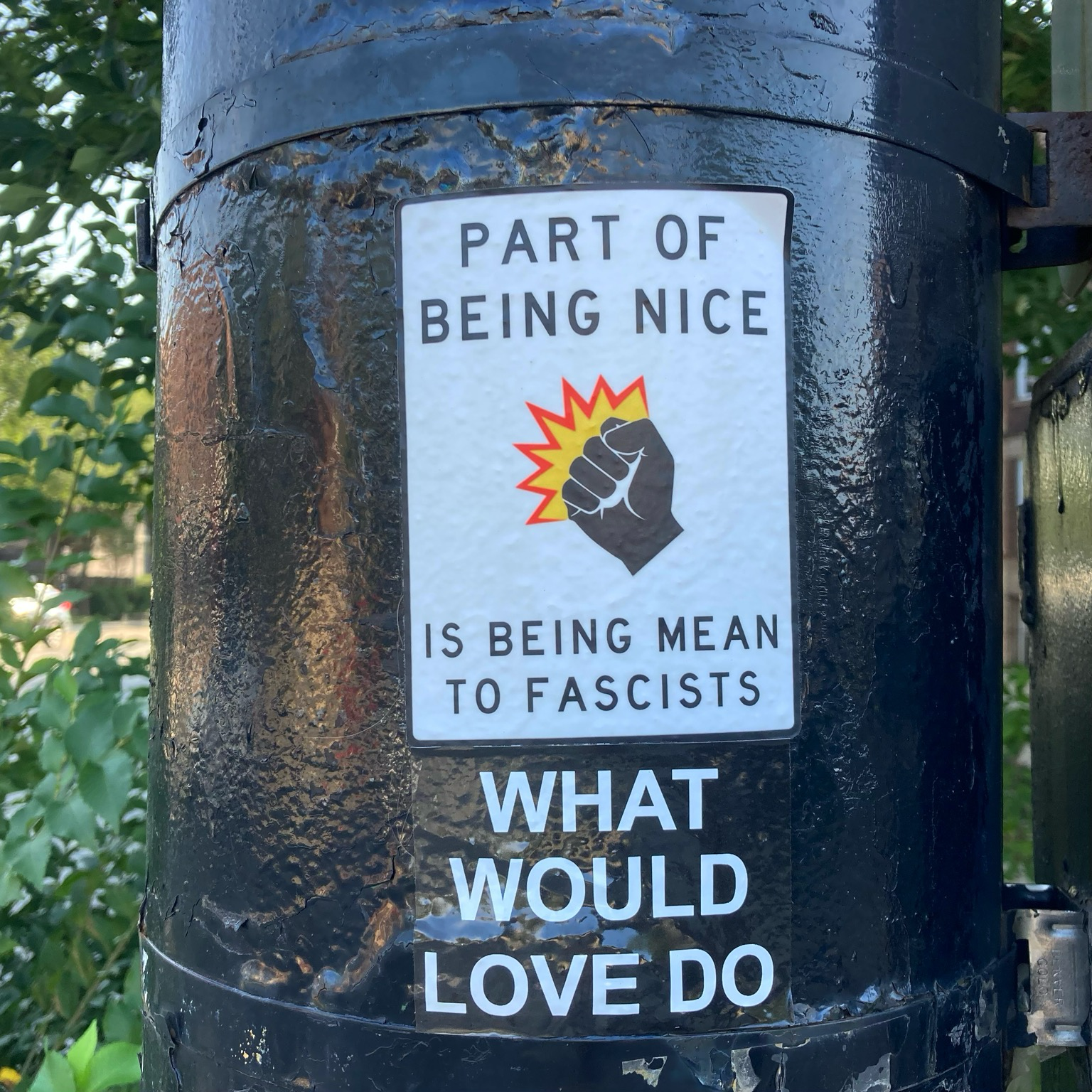Cindy Milstein (they) on Nostr: It was no surprise that Trump won—or to be more precise, that white christofascism ...
It was no surprise that Trump won—or to be more precise, that white christofascism won.
Not (only) because the Democratic Party tried to out-fash the fascists.
Not (only) because liberals believed in the system, and put so many eggs in that basket, whether they voted for anyone or not.
Not (only) because our own despair caused us anarchists to fail to see openings and supply prefigurative possibilities and practices for the disillusioned, abandoned, and so on.
But because “everyday fascism” had already won.
The “banality of evil,” to quote Jewish political philosopher Hannah Arendt (whose writings on authoritarianism are well worth returning to), has long (always?) been woven into the social fabric of the so-called United States. Yet there’s now a hegemonic, commonplaceness to it that most folks don’t see or question any longer—a social fabric of fascism.
On Election Day, for instance, I had to get an X-ray to check for a minor fracture in my finger, and did it within an enormous hospital system covering huge parts of one state. A sign in the X-ray unit read, “If you are pregnant, or suspect you’re pregnant, tell the technician … “—a precaution I’ve seen before when needing an X-ray. But it now contained this addendum: “… so as to protect your unborn child.”
The dog whistles, the fascistic (here, anti-abortion) language, are so loud, blatant, and yet banal, they scream in your face and yet almost don’t register. But words matter; they socialize us. They signal victory and victors—erasing alternatives. They shape and structure practices.
Now, post-election, I hear liberal-nonprofity activists all too quickly again use the language of “write your legislators”—failing to see how far past any semblance of “representative democracy” we are, despite the “fascism vs fascism” nonchoice of a mere week ago they seemed to recognize, briefly. The signs are everywhere, with an everydayness that will increasingly kill, that we are deep in white christofascism and soon deeper.
Our task, among many, is to reassert other languages—making visible not only an antifascist culture but also existing fabrics of solidarity, community self-defense, and communal care.
(photo: stickers—nicely juxtaposed with each other—spotted on the streets of Chicago during Bash Back in September 2023. They read “Part of being nice is being mean to fascists” and “What would love do.”)

Not (only) because the Democratic Party tried to out-fash the fascists.
Not (only) because liberals believed in the system, and put so many eggs in that basket, whether they voted for anyone or not.
Not (only) because our own despair caused us anarchists to fail to see openings and supply prefigurative possibilities and practices for the disillusioned, abandoned, and so on.
But because “everyday fascism” had already won.
The “banality of evil,” to quote Jewish political philosopher Hannah Arendt (whose writings on authoritarianism are well worth returning to), has long (always?) been woven into the social fabric of the so-called United States. Yet there’s now a hegemonic, commonplaceness to it that most folks don’t see or question any longer—a social fabric of fascism.
On Election Day, for instance, I had to get an X-ray to check for a minor fracture in my finger, and did it within an enormous hospital system covering huge parts of one state. A sign in the X-ray unit read, “If you are pregnant, or suspect you’re pregnant, tell the technician … “—a precaution I’ve seen before when needing an X-ray. But it now contained this addendum: “… so as to protect your unborn child.”
The dog whistles, the fascistic (here, anti-abortion) language, are so loud, blatant, and yet banal, they scream in your face and yet almost don’t register. But words matter; they socialize us. They signal victory and victors—erasing alternatives. They shape and structure practices.
Now, post-election, I hear liberal-nonprofity activists all too quickly again use the language of “write your legislators”—failing to see how far past any semblance of “representative democracy” we are, despite the “fascism vs fascism” nonchoice of a mere week ago they seemed to recognize, briefly. The signs are everywhere, with an everydayness that will increasingly kill, that we are deep in white christofascism and soon deeper.
Our task, among many, is to reassert other languages—making visible not only an antifascist culture but also existing fabrics of solidarity, community self-defense, and communal care.
(photo: stickers—nicely juxtaposed with each other—spotted on the streets of Chicago during Bash Back in September 2023. They read “Part of being nice is being mean to fascists” and “What would love do.”)
